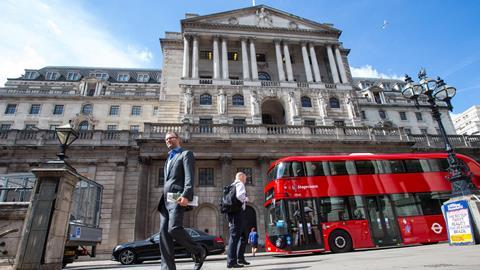Many Gazette readers will have reacted with bewilderment to headlines about the government’s plan for a ‘digital pound’ - inevitably dubbed ‘Britcoin’. Aren't pounds nearly all digital, anyway? And what chancellor in their right mind would want to put an already rickety UK economy at the mercy of crypto booms and busts?
Bluntly, does the plan - set out in a Bank of England consultation paper - mean that the Old Lady of Threadneedle Street is about to plunge onto the crypto dancefloor with all the dignity of a tipsy uncle at a wedding?
In fact there are good reasons for the bank to investigate the option. The consultation document is well worth reading, especially as it raises several issues of interest to solicitors.
First, to clear up one misunderstanding. Of course the pound is already digital: physical cash accounts for only about 3% of the stock of money in the economy. The rest exists in the computerised ecosystem of IOUs issued by commercial banks, we trust under government supervision. In that respect, there is nothing new about a 'digital pound' per se. I suspect the bank chose the term for its technological neutrality, even though what it has in mind is clearly something based on blockchain encryption.
What the bank is talking about here is the public pound, issued by the central bank as physical cash. 'The pound here in Britain, in your pocket,' as prime minister Harold Wilson memorably put it. The document argues that access to public money - a safe liquid asset backed by the state - is essential for confidence in the uniformity of money, which in turn is vital for the smooth running of the economy. The bank says it is worried that the decline in the use of cash and the emergence of new forms of private digital money will put that uniformity at risk. If you offered me payment in Sparks Card points, I would probably ask for a premium on the cash value of the debt; in bitcoin I definitely would. Some kinds of 'pound' are worth more than others.
The digital pound, the bank, would preserve confidence in the value of money, regardless of its form and issuer. It would be a direct claim on the central bank and always have the same value as, and be interchangeable with, the equivalent banknote. The bank would issue digital pounds, which would be recorded in a ‘core ledger’, but consumer-facing services would be developed by regulated private firms – 'payment interface providers'.
As the digital pound would not be interest-bearing, any more than a plastic fiver is, the hope is that interface providers would make their money through innovative digital services. A digital pound could be programmed to do interesting things. One example, mentioned by the bank, is to underpin smart contracts, which carry out specific actions based on pre-defined terms and conditions. In theory, a smart contract thus underpinned would be impossible to repudiate. Solicitors might want to consider the implications: not least of them the need for a client account if money can be tagged in that way.
Another possibility mentioned in the consultation paper is 'embedded finance', where financial services, and in particular payments, are integrated into another industry’s service, function or feature. Examples include, ‘one-click’ purchases of goods via social media platforms, ‘in-game’ payments or, in the future, marketplaces and transactions in the metaverse.
The danger, however, is that a digital pound programmed so that it could work only in certain ways - in effect a pound with a charge built in - would be incompatible with the goal of uniformity and public trust.
Other big questions remain to be answered, the bank concedes. One is the extent of anonymity: the need for central ledgers and identity verification when opening an account would mean the digital pound would never be as anonymous as cash. Whether this is a good or bad thing remans to be seen. Access to the scheme by non-UK residents is another issue: 'The UK authorities might reserve the right not to grant access to digital pounds for non-residents from certain high-risk jurisdictions,' the document observes.
Despite the banks assurance that it is still too early to take the decision on whether to introduce the digital pound, the direction of travel is clear. Legislation already before parliament, the Financial Services and Markets Bill, will establish a regulatory framework for 'stablecoins', which is what the digital pound will be. Let us hope that this receives sufficient scrutiny - and that enough expert opinion feeds into the digital coin consultation to prevent the Old Lady making a fool of herself on the dance floor.
Michael Cross is the Gazette's news editor. He does not knowingly hold any position in crypto assets





































10 Readers' comments